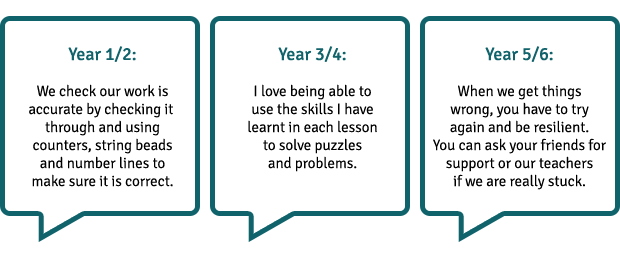Maths

"The 21st century is not looking for humans who serve as calculating machines, but instead it seeks problem-solvers and innovative thinkers. Google, Adobe, Apple and NASA need people who not only know the standard procedures of mathematics, but can also think with agility, flexibility and innovation."
James Tanton, 2018
At West Bretton we are mathematicians!
Our Intent
At West Bretton our intent for maths is to develop children’s skills within the subject, in order to effectively apply mathematics across the curriculum and in everyday life. We want our children to have positive attitudes towards maths and recognise the importance of resilience and confidence through applying problem solving and reasoning skills. We do not accept that ‘some children cannot do maths’, mathematics is for everyone and everyone can, and truly should, be successful in the study of it.
Mathematics teaches us how to make sense of the world around us through developing a child’s ability to calculate, reason and to solve problems. It enables children to understand and appreciate relationships and pattern both in number and space in their everyday lives. We seek to embed the enjoyment and challenge of mathematics in our children’s learning. The teaching of mathematics supports social development through collaborative learning.
Our Implementation
We follow a robust, balanced mathematics programme based on the National Curriculum. Through this we encourage collaborative working, whole class discussion and independent learning opportunities. We provide mathematical activities which aim to strengthen understanding, enrich subject knowledge and deepen mathematical skill base, leading to mastery of all topic areas.
We ensure that all children are able to access lessons in maths through careful planning, differentiation and support. We use assessments to check progress and identify children who are performing well and require further challenge and guided group or individual intervention for children who are not meeting curriculum objectives. We use the White Rose Maths hub, alongside the National Curriculum to support our mastery approach of fluency, reasoning and problem solving.
Our children study mathematics daily and, in doing so, they cover a broad and balanced mathematical curriculum including elements of number, calculation, fractions, geometry, measures, statistics, ratio & proportion and algebra. Our children progress through programmes of study through sequential steps and are given opportunities to embed and consolidate concepts through applying their mathematical understanding to science and other subjects across the curriculum. We focus not only on mathematical methods but also pay particular attention to mathematical vocabulary and use a variety of resources to broaden and deepen mathematical understanding.
In implementing the school’s curriculum:
- Teachers consistently reinforce an expectation that all children are capable of achieving high standards in mathematics.
- The large majority of children progress through the curriculum content at the same pace.
- Differentiation is achieved by allowing children ownership of tasks which emphasise deep knowledge and through individual support and regular intervention where required.
- Teachers use precise questioning in class to assess children regularly to identify those requiring intervention, so that all children remain on track.
- Practice and consolidation play a central role.
- Teachers provide regular challenge and move learning on so that all children are able to tackle a variety of problems and apply their understanding.
- The Concrete, Pictorial, Abstract (CPA) approach is a teaching method that helps students build a deep and lasting understanding of concepts by moving from tangible, physical resources to visual representations and finally to abstract symbols and numbers.
- Each class is filled with maths sentence stems to help children reason and justify their answers.
In KS1, mathematical problems are almost always presented with objects (concrete resources) for children to use. Children may also use manipulatives in KS2. Teachers use careful questions to draw out children’s discussions and their reasoning and then lead children through strategies for solving problems. Independent work provides the means for all children to develop their fluency further, before progressing to more complex related problems. Mathematical topics are taught in blocks, to enable the ‘depth of understanding’ over time. Each unit provides the means to achieve greater depth, with more able children being offered rich and sophisticated problems, as well as exploratory, investigative tasks, within the lesson as appropriate.
Primary Maths - vocabulary progression
WRM Calculation Policy 2024 - all year groups
WRM Calculation Policy - Year 1
WRM Calculation Policy - Year 2
WRM Calculation Policy - Year 3
WRM Calculation Policy - Year 4
WRM Calculation Policy - Year 5
WRM Calculation Policy - Year 6
Our Impact
As mathematicians, West Bretton pupils will be confident in calculating with number, able to apply their knowledge to real-life scenarios and be able to justify with confidence and technical accuracy why they have chosen relevant methods when tackling problems, applying their understanding and completing investigative work.
Children leave our school being able to work methodically where appropriate and unafraid of using concepts to successfully complete open-ended problems and puzzles. They are confident to discuss and share their mathematical thinking with their peers and adults, applying strong oracy skills.
We carry out regular moderations both internally and externally with the pyramid and Local Authority, to share good practise and ensure judgements are accurate. Our maths books and folders are packed with a range of activities showing evidence of fluency, reasoning and problem solving.
The school has a supportive ethos and our approaches in mathematics support the children in developing their collaborative and independent skills. Our feedback and interventions are supporting children to strive to be the best mathematicians they can be.
Our children have a desire for lifelong learning, understanding the relevance of what they have been taught and how it will impact them in their future education and later lives.
Quick guide to the formal methods for the four operations_V2








